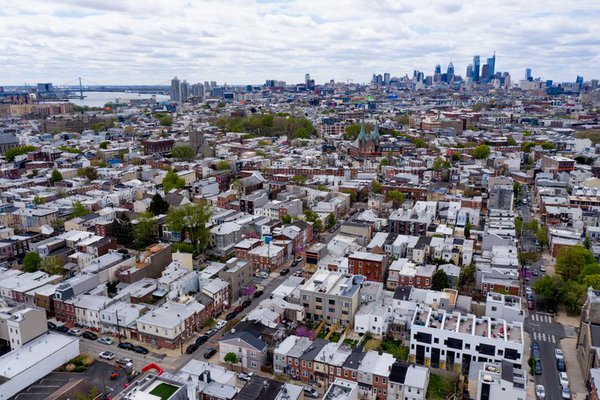Monthly government payments of $500 are being given to 50 low-income Philadelphia residents over the next year as part of a study on how financial assistance impacts lives when no strings are attached to the money, city officials announced Friday.
The experimental program is one of several in the U.S. that aim to better understand the effects of offering guaranteed income — also called universal basic income — to needy families that already qualify for public assistance.
- MORE NEWS
- 76ers to hold virtual public meetings on arena proposal
- As SEPTA workers begin mandated safety training, riders should expect delays
- Suicide deaths reached an all-time high in the US in 2022, CDC reports
Those chosen for the Philly program are all parents who are enrolled in the federal government's Temporary Assistance for Needy Families program, which is administered by states. Specifically, the parents in the study are E-TANF beneficiaries, meaning they have been receiving "extended" benefits for at least 60 months and experience circumstances that prevent them from securing and maintaining full-time jobs.
They will continue to receive their benefits in addition to the monthly $500, which will be distributed using prepaid bank cards and direct deposits and can be spent or saved at their discretion. The first payments were issued to participating families on June 17. A final report on the study will be released in the summer of 2024.
The guaranteed income program, dubbed GROW, is motivated by a push to examine alternatives to traditional welfare programs, which often come with restrictions on how and where benefits can be spent. Most rental assistance programs and the federal Supplemental Nutrition Assistance Program, better known as food stamps, tie the amount of assistance to beneficiaries' income.
A second group of 250 parents receiving E-TANF benefits will receive $50 monthly payments, also without restrictions, to serve as a comparison for the other group. The study will be funded using existing E-TANF resources at a cost of $322,000. The program will be overseen by the city's Office of Community Empowerment and Opportunity.
All Philadelphians who receive E-TANF benefits are enrolled in the city's Work Ready program, a career services initiative that offers counseling for finding professional paths. The GROW study will examine how many people in each of the two groups find full-time jobs by the end of the program.
Proponents of restriction-less cash assistance have long pointed to inequities in how TANF benefits are distributed, especially since each state determines its own benefits plan. About 55% of Black children in the U.S. live in 18 states with the lowest benefits, compared to 41% of Latino children and 40% of white children, Philly officials noted. Poor, single mothers and people of color historically have faced disadvantages in accessing public assistance.
"Due to entrenched racist and sexist narratives, the government began to enforce restrictive requirements, as public assistance expanded to these groups, with the assumption that those receiving benefits had become incapable of managing their own resources,” CEO executive director Mitchell Little said Friday. “What we have learned, however, is that the best way to eliminate poverty is to provide people resources with no strings attached. This project reinforces our commitment to being guided by listening to, supporting, and including communities while working collaboratively to foster greater economic mobility.”
Critics of guaranteed income programs argue that they disincentivize looking for work and that the money could be spent frivolously. During the pandemic, research from the U.S. Census Bureau found that, among needy families with children, the monthly child tax credit issued to about 35 million families led to a drop in food insufficiency and difficulties paying weekly expenses. Survey data suggested that families spent the money they received on covering basic needs.
The city of Stockton, California, created a program similar to GROW in 2019 that offered monthly payments of $500 to residents randomly selected from neighborhoods at or below the city's median household income. That program extended for 24 months, giving payments with no restrictions on spending and no work requirements. Preliminary research on the program found that people in the program experienced reduced income volatility, showed improved mental health and were likelier to find full-time work.
Chicago, parts of Iowa and Cambridge, Massachusetts, all have developed similar programs and studies offering low-income residents $500 monthly payments.
In Pennsylvania, the TANF program benefits about 97,000 children and more than 37,000 adults. The state's average TANF recipient is a family of three receiving $403 per month in assistance.
Before the economic upheaval of the COVID-19 pandemic, 23% of Philadelphia residents lived on less than $26,000 per year and 11% lived in deep poverty, earning less than $13,000 annually, according to The Promise, a poverty action fund that's led by the United Way of Greater Philadelphia and Southern New Jersey. Philly ranks among Cleveland and Detroit as the most impoverished of the largest cities in the U.S.
Researchers from the Philadelphia-based Reinvestment Fund, University of Wisconsin-Milwaukee, Mutual Aid Network and the Fund for Guaranteed Income are partnering with Philadelphia on the GROW program.
“We hope this study reinforces the importance of direct, recurring cash payments as a way to dismantle barriers to economic justice so that all families can live productive, healthy lives,” Little said.

